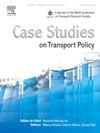Decarbonizing road transport: A systematic literature review based on use case analysis
IF 2.4
Q3 TRANSPORTATION
引用次数: 0
Abstract
Road transport is the largest contributor to carbon emissions among all modes of transportation, prompting significant efforts by governments, organizations, society, and NGOs to mitigate these emissions. The study focuses on cases to identify successful strategies and methods for curbing road transport emissions. It aims to provide an integrated solution for road transport emissions by highlighting the role of different stakeholders. The study employs the Systematic Literature Review (SLR) method following the PRISMA guidelines to achieve the research objectives. A thorough search was conducted in the Scopus database using relevant keywords and the analysis was carried out on 43 selected articles. The key findings of the study highlight several critical solutions for advancing decarbonization, including Mobility as a Service (MaaS), sustainable mobility, technological integration with AI/ML techniques, infrastructure upgrades, and the promotion of multi-modal transportation. The research has certain limitations, such as the need for an expanded database, better sub-categorization within the road transport sector, targeted emission mitigation for individual sub-sectors, and the inclusion of other categories, like railways, within the broader framework of land-based transportation. The study’s novelty lies in a novel and comprehensive framework called ‘Road Transport Decarbonization’ (RTD). RTD emphasizes that achieving decarbonization requires collaborative efforts from society, industry, and policymakers, offering guidance to each stakeholder. Additionally, the study enriches the literature by identifying research gaps and proposing future research questions across various contexts, including policy development, social behavior, technological advancements, and urban transportation.

道路运输脱碳:基于用例分析的系统文献综述
在所有运输方式中,公路运输是碳排放的最大贡献者,促使政府、组织、社会和非政府组织做出重大努力来减少这些排放。该研究侧重于案例,以确定遏制道路运输排放的成功战略和方法。它旨在通过强调不同利益相关者的作用,为道路运输排放提供综合解决方案。本研究采用系统文献综述(SLR)方法,遵循PRISMA指南来实现研究目标。在Scopus数据库中使用相关关键词进行全面检索,选取43篇文章进行分析。该研究的主要发现强调了推进脱碳的几个关键解决方案,包括移动即服务(MaaS)、可持续移动、与人工智能/机器学习技术的技术集成、基础设施升级以及促进多式联运。这项研究有一定的局限性,例如需要扩大数据库,在公路运输部门内进行更好的分分类,针对个别分部门有针对性地减少排放,以及将铁路等其他类别纳入陆基运输的更广泛框架。这项研究的新颖之处在于一个名为“道路运输脱碳”(RTD)的新颖而全面的框架。RTD强调,实现脱碳需要社会、行业和政策制定者的共同努力,为每个利益相关者提供指导。此外,该研究通过确定研究差距并提出未来在各种背景下的研究问题,包括政策制定、社会行为、技术进步和城市交通,丰富了文献。
本文章由计算机程序翻译,如有差异,请以英文原文为准。
求助全文
约1分钟内获得全文
求助全文

 求助内容:
求助内容: 应助结果提醒方式:
应助结果提醒方式:


